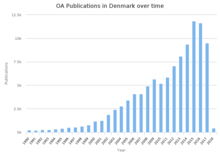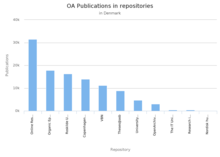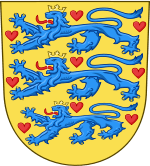Open access in Denmark
Open access to scholarly communication in Denmark has grown rapidly since the 1990s. As in other countries in general, open access publishing is less expensive than traditional, paper-based, pre-Internet publishing.[1]


Repositories and platforms
There are a number of collections of scholarship in Denmark housed in digital open access repositories.[2] They contain journal articles, book chapters, data, and other research outputs that are free to read. The consortial Scandinavian hprints repository began operating in 2008, specializing in arts, humanities, and social sciences content.[3] In 2017, Aarhus University launched an open science platform, SPOMAN.[4][5][2]
Policy
Leaders of the Copenhagen Business School voted in June 2009 to adopt an open access mandate, the first of its kind in Denmark.[6]
In 2012 Denmark's main public funders of research began requiring that grantees deposit articles into open access digital repositories.[7] In 2014, the Danish Ministry of Research created a national policy requiring open access for all publicly funded research published after 2020.[7]
See also
- Nordbib, a funding programme to aid and develop open access initiatives within the academic field in the Nordic countries
- Publishing companies of Denmark
- Internet in Denmark
- Education in Denmark
- Media of Denmark
- Copyright law of the European Union
- Open access in other countries
References
- John Houghton (2009), Cost and benefits of alternative publishing models: Denmark, Denmark: DEFF, OCLC 784112428 – via Knowledge Exchange
- "Denmark". Directory of Open Access Repositories. UK: University of Nottingham. Archived from the original on 6 February 2009. Retrieved 15 April 2018.
- "Browse by Country: Europe: Denmark". Registry of Open Access Repositories. UK: University of Southampton. Retrieved 11 March 2018.
- "The 1st Open Science platform, by Aarhus University, Denmark", Starbios2.eu, 2017
- "SPOMAN Open Science (Fundamental Research within Smart POlymer MAterials and Nanocomposites". Retrieved 9 March 2018.
- Nancy Pontika (ed.). "Unanimous faculty votes". Open Access Directory. US: Simmons College, School of Library and Information Science. Retrieved 11 March 2018.
- "OA in Denmark". Open Access in Practice: EU Member States. OpenAIRE. Retrieved 9 March 2018.
Further reading
- in English
- Bertil Dorch; Birte Christensen-Dalsgaard (2008). "Open access in Denmark". ScieCom Info: Nordic-Baltic Forum for Scientific Communication. 4. ISSN 1652-3202.CS1 maint: multiple names: authors list (link)
- John Houghton (2009), Open Access - What are the economic benefits? A comparison of United Kingdom, Netherlands and Denmark, Knowledge Exchange
- John Houghton; Alma Swan; Sheridan Brown (2011), Access to research and technical information in Denmark (PDF), ISBN 978-87-923-7287-1,
Report to The Danish Agency for Science, Technology and Innovation (FI) and Denmark’s Electronic Research Library (DEFF)
- Denmark ́s National Strategy for Open Access (PDF), Ministry of Higher Education and Science, 2014
- CRIStin (2015), Education, Research and Open Access in Denmark, PASTEUR4OA Case Study, doi:10.5281/zenodo.35643
- Eelco Ferwerda; Frances Pinter; Niels Stern (2017), "Country Study: Denmark", Landscape Study on Open Access and Monographs: Policies, Funding and Publishing in Eight European Countries, Knowledge Exchange, doi:10.5281/zenodo.815932
- Walt Crawford (2018). "Denmark". Gold Open Access by Country 2012-2017. US: Cites & Insights Books.

- in other languages
- Anbefalinger til implementering af Open Access i Danmark Afsluttende rapport: fra Open Access Udvalget [Recommendations for implementing Open Access in Denmark, Final report: from the Open Access Committee] (PDF) (in Danish), Danmarks Elektroniske Fag- og Forskningsbibliotek, 2011
- Open Access-politik for offentlige forskningsråd og fonde [Open Access Policy for Public Research Councils and Funds] (PDF) (in Danish), Uddannelses- og Forskningsministeriet, 2012
- Sivertsen, G. and Larsen, B. (2012), Forskningsformidling i danske tidsskrifter: Om muligheten for fri adgang til vitenskapelige artikler [Dissemination of research in Danish journals: on the possibility of free access to scientific articles] (PDF) (in Norwegian), NIFU, ISBN 978-82-7218-843-5CS1 maint: multiple names: authors list (link)
- Sofie Carsten Nielsen (2014). "Danmarks strategi for Open Access". Revy (in Danish). Danske Fag-, Forsknings- og Uddannelsesbiblioteker. ISSN 1904-1977.
External links
- "Denmark". Global Open Access Portal. UNESCO.
- Peter Suber (ed.). "(Denmark)". Open Access Tracking Project. Harvard University. OCLC 1040261573.
News and comment from the worldwide movement for open access to research
- "Browse by Country: Denmark". ROARMAP: Registry of Open Access Repository Mandates and Policies. UK: University of Southampton.
- Open Knowledge Danmark, part of Open Knowledge International
- Open Access (in English and Danish), Copenhagen: Ministry of Higher Education and Science
- "Our members: Denmark". Sparceurope.org. SPARC Europe.
Scholarly Publishing and Academic Resources Coalition
